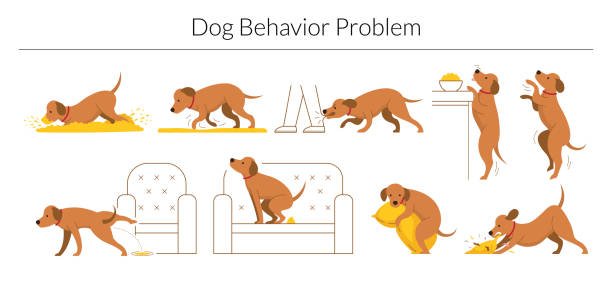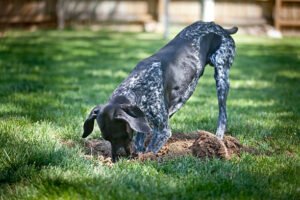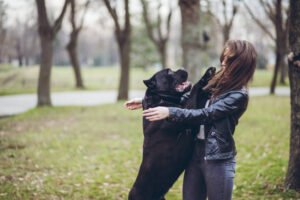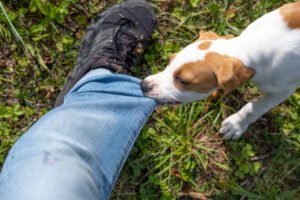
If you are new to owning a dog, thinking about getting a dog, or want to help your dog with a challenging issue, it’s essential to understand common dog behaviour problems. Obedience training provides a good foundation for preventing and managing these issues. In your dog‘s view, these behaviours might seem normal to them, but not to us humans when they overdo it. In this article, we will list 10 of our dog’s behaviours.
Barking

Yes, barking is a normal form of communication for dogs, and all dogs do this, excluding the basenji, also known as the bark-less dog. Barking can be a problem if it is done exclusively. Our dogs bark for several reasons, and we like how they do, so before you can correct excessive barking, try to understand why your dog is barking excessively in the first place. The different kinds of barking that dogs do:
- Warning or alert
- Responding to other dogs
- Playfulness and excitement
- Attention-seeking
- Anxiety
- Boredom
Some dog owners might consider Attention-seeking and Boredom barking excessive barking, which they would consider unnecessary barking. If you’re this owner who doesn’t like unnecessary barking, then you can consider teaching your dog to bark commands. Address any underlying causes of barking.
Chewing

Chewing is a natural action exhibited by puppies, not dogs. Chewing is an important activity for most puppies; it’s just part of how they are wired. Let’s return to where we discussed that it’s a natural action exhibited in puppies, not dogs. Chewing in puppies is always considered play and a sign of activeness. Still, if your puppies continue this behaviour as they grow, then it quickly becomes a behaviour problem because an adult dog that chews will cause destruction. The most common reasons puppies chew are;
- Puppy teething
- Boredom or excess energy
- Anxiety
- Curiosity
You can consider getting plenty of durable chew toys for your dog, as it likes chewing. It’s important to keep personal items away from your dog when you are not home, or they are not being supervised.
Digging

Every dog owner dogs likes their dogs digging, and this is due to the damage they cause to the floor without them noticing. If given the chance, most of the dogs on this planet will do some digging; especially certain dog breeds, like terriers, are more prone to digging because of their hunting histories. There are several reasons why most dogs dig; here are some:
- Hunting instinct
- Boredom or excess energy
- Nesting or cooling off
- To hide items like bones or toys
- To enter or exit an area
If digging seems inevitable, you can set aside an area where your dog can freely dig. It can be frustrating if your dog digs up your yard, even some of your plants. It’s important to determine the cause of the digging and then look for a suitable method to eliminate that source. Give your dog more exercise, and spend more quality time together.
Separation Anxiety

Separation anxiety is most of the most common source of almost all dog behaviour problems, which leads to other problems. Other behavioural problems that separation anxiety can lead to are unnecessary vocalisation, inappropriate urination and defecation, and other forms of destructive behaviours. However, not all cases show that separation anxiety is the leading cause of all these different problems. Let’s dive into the true signs of separation anxiety:
- Our pup gets nervous when the owner gets ready to go out.
- Remember that most misbehaviour from pets tends to happen within the first 15 to 45 minutes after their owner leaves.
- The dog really likes to be close to its owner all the time.
- The dog always wants to be close to its owner and tries to show affection by touching them whenever it can.
True separation anxiety requires dedicated and constant training, love and affection, behaviour modification, and desensitisation exercises. In very serious situations, the vet might suggest taking medication.
Inappropriate Elimination

Dogs do this often, and we humans hate it; urinating and defecting anywhere are among the most frustrating dog behaviours. Your dog’s Inappropriate elimination behavior can cause damage to your home and may even lead to your dog being unwelcome in public places. It is recommended that you discuss this with your veterinarian or dog behaviourist, but with your vet first so he can rule out health problems. If no medical cause is found, you can head to their dog behaviourist to determine the reason for the behaviour. But some causes of inappropriate urination and defecation are;
- Submissive/Excitement
- Territorial marking
- Anxiety
- Lack of proper potty training
Note: inappropriate elimination is unavoidable in puppies, especially before 12 weeks of age, so don’t get harsh on them when they do. Older dogs often need significant behavior training to break ingrained habits.
Begging

Begging is a bad habit that should be discouraged, but many dog owners unknowingly encourage it. Giving your dog food anytime they see you eating or having a snack can lead to digestive problems and obesity. Dogs beg because they love food. Yes, it is hard to resist that longing puppy look, but it’s better to resist it before it creates a problem in the long run.
It’s better not to be around your dog when you are about to eat because they will surely beg. If necessary, you can confine your dog to another room, and if they behave well, you can offer a special treat after everyone is done eating.
chasing

A dog’s desire to chase moving things, whether big or small, is simply a display of their predatory instinct. Many dogs will chase other animals, people, cars, and other moving objects. It may not be so dangerous at first, but these can lead to destructive and devastating outcomes with time. Here are some steps to prevent your dog from chasing things, leading to disasters.
- Please always keep your dog on a leash (unless they are being supervised indoors).
- Give your dog a recall training
- Have a dog whistle or dog clicker to get your dog’s attention.
Jumping Up

Dogs naturally jump up to reach and greet others. Puppies do it to greet their mothers and may continue to jump up when they meet people. They also jump up when they are excited or want something a person is holding. While this behaviour might initially seem cute, it can become annoying or risky.
There are various techniques to discourage jumping, but not all are effective. Some methods, like lifting a knee, grabbing the paws, or pushing the dog away, might work in certain situations, but they can send the wrong message to most dogs. The most effective approach is to ignore the dog completely; you can walk away without making eye contact, speaking, or touching the dog. Then, the dog might calm down and stay still. With time, the dog will learn that jumping up does not result in any form of attention.
Biting

puppies bite and nip for several reasons: they like to explore the environment. Owners often need to show their puppies that mouthing and biting are unacceptable by continuing to train them to stop biting or nipping. In older dogs, biting and nipping are mostly a motivation for aggression, but there are some other reasons why dogs might bite or nip;
- Fear
- Defensiveness
- Pain or sickness
- Predatory instinct
Owners and breeders can help decrease the tendency for any dog to bite through proper training, early socialisation, and breeding practices.
Aggression

Aggression is the one dog behavioural problem that no dog owner would want. It is important to know that any dog breed has the potential to exhibit aggressive behaviour, regardless of breed, size or history. Unfortunately, some breeds are labelled “dangerous” to the exhibit of being banned in certain countries.
A dog’s environment and upbringing have a major impact on behaviour. Any dog, no matter the type, might have some aggressive behavior due to their genetics. Some signs of aggression are growling, snarling, showing teeth, and biting. Biting is similar to aggression, but canine aggression is more serious.
If you notice your dog is highly likely to be aggressive, you can immediately consult your vet, as it may stem from a health problem. Then, if it is not medically related, you can seek the help of a professional dog behaviourist or dog trainer.
Also read: How to Stop Aggression in Dogs
Leave a Reply